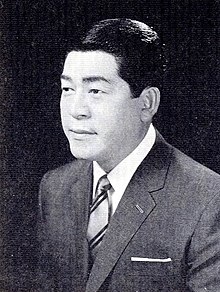| This article needs additional citations for verification. Please help improve this article by adding citations to reliable sources. Unsourced material may be challenged and removed. Find sources: "Michiya Mihashi" – news · newspapers · books · scholar · JSTOR (January 2009) (Learn how and when to remove this message) |
| Michiya Mihashi | |
|---|---|
 | |
| Background information | |
| Birth name | Michiya Kitazawa 北沢 美智也 |
| Also known as | Michiya Mihashi 三橋 美智也 |
| Born | (1930-11-10)November 10, 1930 Hokkaido, Japan |
| Died | January 8, 1996(1996-01-08) (aged 65) |
| Genres | Min'yō, Enka |
| Occupation | Singer |
| Years active | 1954–1996 |
| Labels | King Records |
Michiya Mihashi (三橋美智也 Mihashi Michiya, November 10, 1930 – January 8, 1996), born Michiya Kitazawa (北沢 美智也 Kitazawa Michiya) in Kamiiso, Hokkaidō, was an enka singer in postwar Japan. Along with Hachiro Kasuga and Hideo Murata, he was regarded as one of the most notable singers to have established the genre enka.
Mihashi was among the leading Enka singers in his time and was known for his high-pitched and elastic singing voice. He recorded around 2,500 songs. By 1983, he sold more than 100 million records.
Takashi Hosokawa was his pupil.
Biography
Mihasa began his career as a singer of Japanese folk music or min'yō, winning a min'yō competition in his native Hokkaidō at age 11. In 1954, he made his record debut with the song "Sake no Nigasayo" (酒の苦さよ). His 1955 song "Onna Sendō Uta" (おんな船頭唄) became a hit song.
In 1960, he sang the theme song for the tokusatsu series Kaiketsu Harimao, which was created by Shotaro Ishinomori.
In the latter half of the 1970s he reinvented himself, adopting a 'rough' style and hosting a radio program aimed at young men, from whom he acquired the nickname "Michie" (ミッチー). In 1983, he set a record by becoming the first Japanese singer in history to sell one hundred million records.
Mihasa died in hospital in Osaka on January 8, 1996, from multiple organ failure at the age of 65.
Discography
- "Onna Sendo Uta" (おんな船頭唄, Female Waterman Song) : 1955
- "Ah Shinsengumi" (あゝ新撰組) : 1955
- "Ringo Mura Kara" (リンゴ村から, From Apple Village) : 1956
- "Aishu Ressha" (哀愁列車, Melancholy Train) : 1956
- "Kojo" (古城, Old Castle) : 1959
- "Takeda Bushi" (武田節) : 1961
- "Tsugaru Jongara Bushi" (with Takeshi Terauchi & Bunnys) : 1967
See also
References
- ^ Colin Larkin, ed. (1992). The Guinness Encyclopedia of Popular Music (First ed.). Guinness Publishing. p. 1687. ISBN 0-85112-939-0.
- ^ "'Enka' star Murata dies of pneumonia". The Japan Times. 14 June 2002. Retrieved 29 September 2021.
- "三橋美智也とは". Kotobank.jp. Retrieved 29 September 2021.
- "The day that enka singer Hachiro Kasuga died" (in Japanese). Nippon Television. 2008-10-22. Retrieved 2009-04-22.
- "Mihashi Michiya" (in Japanese). Shikoku Broadcasting. 2009-02-09. Archived from the original on 2010-12-09. Retrieved 2009-02-09.
- "Mihashi Michiya" (in Japanese). goo. Archived from the original on 2009-07-10. Retrieved 2009-02-12.
External links
- Website in King Records (in Japanese)
This article about a Japanese singer is a stub. You can help Misplaced Pages by expanding it. |
This article about a Japanese musician is a stub. You can help Misplaced Pages by expanding it. |